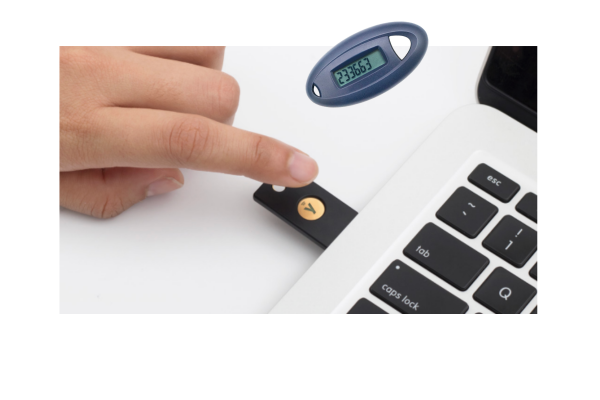
Hardware tokens are small, portable devices designed to serve as a second factor for authentication, supplementing or replacing traditional passwords. YubiKeys, produced by Yubico, are among the most popular hardware tokens, but alternatives like FEITIAN and Thales exist as well.
Unlike text codes or authenticator apps, hardware tokens are dedicated devices. They often connect to computers or mobile devices via USB, NFC, or Bluetooth.
Are Hardware Tokens More Secure Than Other MFA Methods?
Yes, hardware tokens are generally more secure than SMS or app-based MFA for several reasons:
-
No Reliance on Mobile Devices: They are not susceptible to SIM-swapping, malware, or exploits targeting smartphones.
-
Offline Capability: Tokens work without internet or cellular connectivity, ensuring authentication even in remote or high-security environments.
-
Tamper Resistance: Hardware tokens are designed to be difficult to clone or tamper with, and they do not transmit personal data during authentication.
-
Reduced MFA Fatigue: Unlike push notifications, which can be abused by attackers to trick users, hardware tokens require deliberate user action.
Because the device must be physically present, attackers cannot remotely intercept or replicate the authentication process, making these tokens highly resistant to phishing and credential theft.
When Are Hardware Tokens Better to Use?
Hardware tokens are ideal in the following scenarios:
-
High-Security Environments: Organizations handling sensitive data, financial transactions, or critical infrastructure benefit from the strong protection hardware tokens offer.
-
Privileged Accounts: Admins and users with elevated access should use hardware tokens to reduce the risk of account takeover. Owners and C-level execs are targets, so should use them, too.
-
Environments Without Reliable Connectivity: Hardware tokens work offline, making them suitable for remote locations or secure facilities.
-
Users Without Mobile Devices: Employees who cannot use smartphones, or where mobile devices are prohibited, can rely on hardware tokens.
-
Compliance Requirements: Industries governed by strict regulations (GDPR, PCI-DSS, NIST) often require or recommend hardware-based authentication.
Benefits of Hardware Tokens
-
Enhanced Security: Resistant to phishing, credential theft, and malware.
-
Simplicity: Easy to use-just insert or tap and authenticate.
-
Durability: Devices are robust and can last for years.
-
Privacy: No personal data is transmitted during authentication.
-
Compliance: Meet or exceed regulatory requirements for strong authentication.
-
Cost Efficiency: While there is an upfront cost, tokens often outlast software solutions and do not require ongoing licensing fees.
Drawbacks and Limitations
-
Physical Loss: If a token is lost or stolen, access may be temporarily disrupted. Organizations should have recovery processes in place.
-
Upfront Cost: Hardware tokens require an initial investment, though alternatives to YubiKey may be more affordable.
-
User Training: Some users may need guidance on how to use and manage their tokens.
-
Backup Needed: Always register a backup token or alternative MFA method to avoid lockouts.
How Do You Set Up a Hardware Token?
Setting up a hardware token like a YubiKey is straightforward and goes something like this (exact steps depend on device):
-
Register the Token: Log in to the security settings of the service you wish to protect (e.g., Google, Microsoft, Duo). Look for the option to add a security key or hardware token.
-
Insert or Tap the Token: Plug the token into a USB port or tap it on an NFC-enabled device when prompted.
-
Configure the Token: For OTP-based tokens, you may need to use a management tool (like YubiKey Manager) to generate and store secret keys. For FIDO2/WebAuthn, the process is usually automatic.
-
Complete Registration: Follow on-screen prompts to complete the setup. Some services allow you to register multiple tokens for backup.
-
Backup and Recovery: Store backup codes or register a secondary token in case your primary device is lost.
Frequently Asked Questions
What happens if I lose my hardware token?
Most services allow you to register multiple tokens or use backup codes. Organizations should have a recovery policy for lost tokens.
Can hardware tokens be used alongside other MFA methods?
Yes, hardware tokens can be combined with biometrics, authenticator apps, or backup codes for layered security.
Are hardware tokens difficult to deploy for businesses?
No, modern tokens integrate easily with identity providers and authentication systems, and many vendors offer plug-and-play solutions.
If my laptop and YubiKey are stolen, can the thief can access my accounts?
No. A stolen YubiKey alone does not grant access to your accounts. Most services require both the hardware token and a password (or biometric/PIN verification). For example:
-
FIDO2/WebAuthn: The thief would need your password and physical access to the YubiKey. Even then, many services require a PIN or fingerprint to activate the token.
-
OTP Codes: These expire within seconds, so a stolen token with a static code is useless unless combined with your password.
Best Practice: Use strong passwords and enable biometric/PIN protection on your devices to create layered security.
Are Hardware tokens unphishable in all cases?
Mostly true, but not absolute. YubiKeys verify the legitimacy of the website’s domain before authenticating, making them immune to most phishing attacks. However, if a user is tricked into entering their password on a fake site and physically taps their YubiKey, the attacker could potentially gain access. This is why user vigilance remains critical.
Do all services support hardware tokens?
Not yet. While major platforms (Google, Microsoft, GitHub) and password managers (1Password, Bitwarden) support hardware tokens, many smaller services still rely on SMS or app-based MFA. Always check a service’s authentication options before relying solely on a hardware token.
Does Losing a YubiKey mean permanent lockout?
No. Most services allow you to:
-
Register multiple backup tokens (e.g., a second YubiKey stored securely).
-
Use backup codes printed or saved in a password manager.
-
Fall back to another MFA method (e.g., authenticator app) if configured.
Are hardware tokens inconvenient for everyday use?
Not generally:
-
Passwordless logins: FIDO2-enabled tokens allow single-tap authentication, which is faster than typing a password.
-
Mobile use: NFC-enabled tokens (e.g., YubiKey 5 NFC) work seamlessly with smartphones.
-
Travel-friendly: Tokens don’t require batteries or connectivity, making them ideal for offline environments.
Can hardware tokens be infected by malware?
Extremely unlikely. YubiKeys and similar tokens do not store malware-vulnerable firmware or transmit data beyond cryptographic signatures. They are “read-only” devices in most implementations, making them immune to most malware attacks.
Do I upgrade or replace my tokens?
You only need to replace your token if it fails, is lost, is affected by a critical vulnerability, or you need new features. Firmware cannot be upgraded on the majority of tokens (for security reasons), so upgrading the device means purchasing a new one. Some use batteries, but others don't, so you can expect tokens to last 2-10+ years. Just watch out for security advisories from the company you buy from.
Conclusion
Hardware tokens like YubiKeys represent the gold standard for multi-factor authentication, offering unmatched security, phishing resistance, and reliability. While they require a modest investment and careful management, their benefits far outweigh the drawbacks -- especially for users and organizations seeking the highest level of protection for their digital assets.


